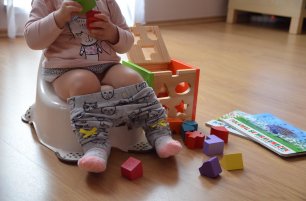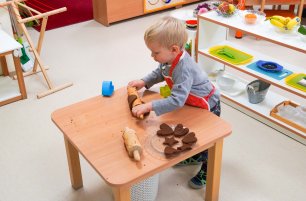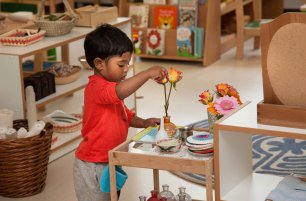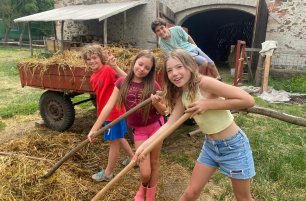Staff Interview with Joyce McCusker
How were you first introduced to Montessori education? What led you to seek Montessori training for yourself?
After my first daughter was born, I met a woman named Cathy, who was a La Leche League Leader, as well as a Primary Montessori teacher. I became curious about the Montessori teaching method and started reading books about it; it made a lot of sense to me. I also learned how to make some Montessori materials. Using these methods, I taught both of my girls at home, and later enrolled them in a Montessori Elementary School.
I volunteered weekly in Kaitlin’s class during her first grade. Her teacher was hesitant about this because Elementary children need independence and time away from their parents to focus on their peer relationships. However, he was so impressed by my interactions with the children that he ended up offering me a job as a classroom assistant, and later that led to me taking the Elementary I - II training.
Before you became a Montessori teacher, you studied History and Political Science at Duke University. How does this apply to your work with Montessori? Did any of your studies impact your beliefs about education and teaching?
When I enrolled at Duke University, my (naïve) ambition was to become a politician so that I could work toward making life better and fairer for people. That ambition changed as I realized my personality was not suited to the political world, but I finished my degree.
Throughout my life, I have continued to read books of history on many subjects. I think this has made me a better teacher because I can share a lot of information with my students, as well as help them understand that as humans, we still have a lot to learn. I hope to inspire my students to become adults who want to contribute to that understanding through their own research.

You spent a year studying in China, what were the greatest lessons you learned from that time?
I think the most important lesson I learned through my experience living in Hong Kong, which was still a British protectorate at the time, was that people all over the world are basically the same. They have the same needs and desires. It doesn’t matter what language they speak, what kind of food they eat, or what religion they practice. Most people are working hard to get through their lives as best they can with the resources they have available.
Based on your experiences, what do you see as the biggest advantages of attending a Montessori school, especially in comparison to traditional educational models?
I think there are two big advantages for students attending Montessori elementary programs. Through discovery of their own learning processes, students are able to be more successful in life because they are able to work from a solid foundation of self-knowledge. The trust that develops between the students and their teachers forms the basis upon which students learn to advocate for themselves and understand the resources available to them.
Do you feel like there is a difference in education, from when you started in 2000 to now?
Yes, I think the use of electronic devices has changed the way humans interact in the world in general, and that has changed how and what we teach. For example, when I first started teaching, my students got really excited about learning about money. Now, because most adults engage in electronic financial transactions, few children see the adults around them using cash. They have less respect for and curiosity about how money works and what can be done with it.
Another change that has occurred as a result of the use of electronic devices, in my opinion, is that they have less time to make up games and to engage in exploratory play, impacting the development of their imagination.
That said, having computers and access to the internet allows me to provide information and resources to my students that otherwise would be hard or impossible. Some Montessori teachers argue that because Maria Montessori did not include use of computers in the Elementary curriculum, it’s not something we should be teaching. Others, myself included, think that Montessori’s intention to provide students with the tools they need to be successful adults in the world in which they live requires that we include the use of computers in our classrooms.

You hold the AMS Elementary I-II diploma, what is your favorite thing about children ages 6-12?
My favorite thing about teaching elementary students is the conversations we have. I enjoy sharing my knowledge with them, and I love hearing their ideas and discoveries. I feel like each school year is a year-long conversation with that particular group of students.
You have two adult daughters. What’s your favorite piece of advice to give to parents?
I don’t really like to give advice because I think it implies that I have all the answers. I can only share what worked for me with my children. That said, I think the most important thing parents can do for their children is to let them know that they are loved and supported, and that their parents are always on their side - even when it doesn’t seem that way to the child. This can be especially challenging when parenting teenagers who think they are ready to be adults, but don’t yet have the experience or knowledge they need.
Who or what is one of your biggest influences?
My mother was a big influence on me. When I was a child, I thought she was perfect. She was a nurse before she married and had a family, so she knew how to heal all wounds - physical and emotional. Or so it seemed to me at the time. I thought that this was an inherent trait in all mothers. As I became an adult, I learned to see my mother’s flaws and that helped me be able to make my own decisions about how to parent my own children, not just imitate my own mother.
What does your life look like outside of IMSP?
I have always loved to travel and to explore the world. When I was a child, my parents took us camping in national parks, we backpacked through state wilderness areas, and we explored national monuments around the country. By the time I graduated high school, I’d been in 43 of the 50 states, as well as Mexico. I continue to enjoy travelling with Greg. We don’t think of ourselves as “tourists” because when we travel we want to learn about the history and geography of the places we visit.
How would you describe yourself if you had 10 seconds?
I’m a curious person who enjoys reading on a lot of different subjects. I’m a hard worker and independent. I love teaching, and I’m grateful that I get to do that in Prague!
What is your life motto or a quote you particularly enjoy?
I don’t think of it as a motto, but I think my biggest life lesson is learning and practicing patience.
My 5 favorite places to travel:
Cape Cod, Massachusetts
Yellowstone National Park
Outer Banks, North Carolina
Concord/Lexington, Massachusetts
Anywhere on the Appalachian Trail
5 places I hope to be able to travel to when the pandemic is over:
To see my children and my parents
Scotland
Ireland
Paris
Karlovy Vary (and many other places in CZ that we haven’t been yet!)
Want to learn more? Read our next article:




